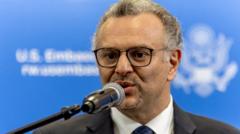Africa remains a focus for President Trump, according to U.S. Senior Advisor for Africa Massad Boulos, despite the significant aid cuts implemented by the administration that have led to alarming humanitarian consequences across the continent. While many have expressed concern over the discontinuation of critical programs that provided vital health support, Boulos conveyed to BBC's Newsday that Trump places high value on Africa and intends to foster a productive relationship, regardless of the hiccups in foreign aid.
These aid reductions, which were announced shortly after Trump's inauguration as part of his "America First" initiative, have notably impacted healthcare initiatives like the distribution of essential HIV medication. The World Health Organization has indicated that several countries, predominantly in Africa, face imminent shortages due to the U.S. halting foreign aid. The Institute for Security Studies projected that the fallout from these cuts could push an additional six million Africans into extreme poverty in the coming year.
On the ground, the repercussions of these cuts have been dire. Recent reports from Save the Children revealed that eight individuals, including five children, died in South Sudan seeking medical care amid a cholera outbreak attributed to the closure of local clinics due to funding cuts. When questioned about the connection between the reported deaths and aid reductions, Boulos emphasized the necessity for the U.S. to reevaluate aid programs for effectiveness, asserting, "It is absolutely necessary for the U.S. to review some of these programs for much more efficiency and transparency."
Amid these challenges, Boulos also highlighted the interest from U.S. corporations in mining operations within the Democratic Republic of Congo, a country rich in essential minerals for modern technology. Congolese President Félix Tshisekedi noted that U.S. investment could potentially stabilize regions plagued by conflict, provided surrounding nations cease hostile actions.
Addressing concerns that the U.S. focus is primarily economic rather than humanitarian, Boulos stated, “Our job is to promote U.S. interests and strategic partnerships.” He underscored Trump’s commitment to fostering global peace, particularly regarding ongoing struggles in Sudan.
Boulos, who has familial ties to the Trump family, also expressed optimism about U.S.-Africa relations, stressing that reports concerning the downsizing of U.S. embassies in Africa were overstated. He reaffirmed Trump's assertion that Africa is integral to his administration's agenda.
Despite the complexities posed by recently announced tariffs—some as high as 50% on import goods—Boulos remained confident that the net effect would be minimal for most African countries, suggesting that these tariffs target minor trade volumes. For many nations, negotiations are underway to ensure equitable outcomes.
Countries like Lesotho, which has benefited substantially from the African Growth and Opportunity Act (AGOA), are particularly vulnerable as they navigate these recent changes while accounting for significant portions of their national income through textiles exported to the U.S. The renewal of AGOA under the prevailing congressional leadership remains uncertain, posing additional challenges for U.S.-Africa trade relations.





















